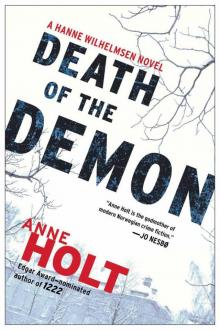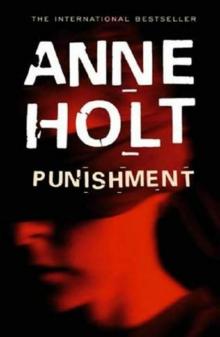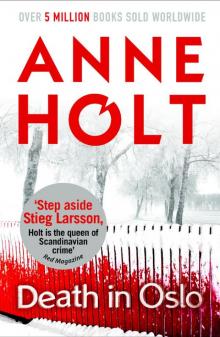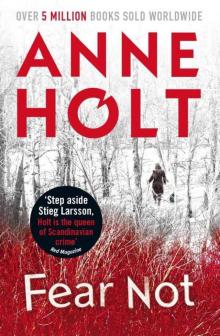No Echo Read online
Page 12
Interviewer:
But you’re quite sure that Brede didn’t have any health problems? Headaches, for instance? Did he take any medication?
Witness:
No, never. I can be quite categorical about that. He often said to me that I mustn’t take such things. Pills and suchlike. He was very principled. Thought it was better to put up with some pain. Everything passes in the end. Even though I do in fact suffer sometimes. Yes, my joints … They bother me sometimes. But he always said, “It’s better not to take anything, Mother.”
Interviewer:
Did you know any of his friends? Who were his close friends, do you think?
Witness:
Oh, there were so many!
Interviewer:
But were there any that you knew well – childhood friends, for instance?
Witness:
No, Brede wasn’t like that. He looked forward, did Brede. Never back. Yes, of course he had lots of friends at school, but Brede has always gone his own way. When his friends got married and were picking up their children from kindergarten, and that sort of thing that men do nowadays, well, that wasn’t anything that appealed to Brede. He was always in the company of such interesting people. He told so many amusing stories about the people he met.
Interviewer:
But was there nobody you were acquainted with?
Witness:
No, Brede always kept extremely private.
Interviewer:
Did he have any enemies?
Witness:
No, certainly not. Everybody liked Brede, you can see that from all they said about him in magazines and everything.
Interviewer:
Did you know that he had received threatening letters?
Witness:
Threatening letters? Oh yes. Those dreadful letters that they wrote about in one of those magazines – I don’t remember all of it. That was absolutely ghastly. It must have been somebody who couldn’t stand Brede being so talented. He was quite exceptional. Whoever wrote that dreadful (unclear voice, indistinct) … it must have been an abnormally jealous person.
Interviewer:
What did he say himself about these letters, then?
Witness:
Say himself … (Clearing her throat.) Actually, I can’t remember that we ever talked about that particular subject. No. I don’t think we did.
Interviewer:
Why not?
Witness:
It wasn’t really a very pleasant topic to discuss over Sunday dinner, do you think?
Interviewer:
When did you actually last see your son, Mrs. Johansen?
Witness:
Last … I can’t honestly remember. It can’t possibly have been very long ago.
Interviewer:
Was he there last Sunday? A week ago, the day he …
Witness:
(Lengthy pause, crying, new sounds reminiscent of asthmatic wheezing.) No. He wasn’t. He … (A great deal of indistinct speech, coughing, and crying.)
Interviewer:
But is it possible to say when you saw him last? What did you talk about then? (Still violent weeping.) We’ll soon be finished now, Mrs. Johansen. We can take a break anyway (Rustling.) … I’d like you to look at this personal property report with me. It lists here what your son had in his possession when he … Can you take a look at this and see if there’s anything unusual here? Anything that might be missing?
Witness:
(Tearful.) Yes, I’ll do the best I can. Could I have some water, by the way? (Rustling, indistinct sounds.)
Interviewer:
I think we’ll turn this off for the moment, and then we can come back when you’ve had a look at this. The interview is terminated at, let’s see … 14.48.
Interviewer:
The interview is continued: the time is 15.12. The witness has had a break and gone to the toilet. She has looked at the personal property report. Do you have any comment to make about the clothes or items that were found on Brede?
Witness:
No, it seems entirely normal. The camel coat – he always suited that … (Mumbling.) The tie pin, the watch … There is one thing, though. He always used to wear gloves. He was so careful about wearing gloves, even in the spring. Didn’t like to get dirty, Brede. It says a scarf there, but no gloves.
Interviewer:
Thanks, Mrs. Johansen. You’ve been a great help. The interview is concluded at 15.16.
21
Daniel stayed at home. It was Sunday evening and he ought to do some reading. He was straggling far behind with the reading list and had a subject exam coming up in January. The books were stashed in an unopened cardboard box behind the door. Daniel lay on his back in bed, trying to shut out the odor of mold. It smelled as though the damp stuffiness had worsened since he had moved in, and now it was forcing itself upon him like the stench of putrefaction. The entire week had been spent achieving nothing. Apart from moving house, that is. Since he hardly owned more than a stereo system and a few boxes of books and CDs, it had all been done and dusted on Saturday morning. Actually he should have been at work on both Tuesday and Thursday, but he had phoned in sick. Because he was not a permanent employee at either workplace, he lost money. He needed money.
A week had elapsed since Brede Ziegler’s murder, and Daniel began to cry. At first the tears came quite quietly. Then his throat tightened. Sobbing, he used his hands to cover his face.
Not even Taffa had said anything much.
It was fine that Thale grasped none of it. That was how it always was. Daniel sat up in bed to catch his breath. Snot ran from his nose and, gasping, he wiped it with the back of his hand before stuffing his hand under his T-shirt and letting his forefinger slide across his dry skin. He should really use cream more often. He suffered from eczema when he forgot those damn lotions.
Taffa usually understood. Taffa could read him the way other people’s mothers normally did. He had gone to see her and made eye contact, just as he always did when he wanted her to see.
Maybe she didn’t want to.
Maybe she didn’t understand any of it, either.
Daniel tossed and turned in bed, stretching his arms above his head, and cried through yet another night.
22
It was the morning of Monday December 13 when Hanne Wilhelmsen rewound the tape for the twenty-first time.
“Police, central switchboard.”
“Eh, hmnnn …”
The sound of violent, prolonged coughing crackled through the loudspeaker.
“Hello? Hello? What’s it about? Who’s calling?”
“… dead man. On your steps.”
“Can you speak more clearly?”
“Outside. Oh, fuck!”
Something dropped to the floor.
“Bloody hell, outside at your place, I told you already. You can’t be so slow on the uptake! A dead man. Outside at your place. Go round the back of the police station, then.”
That was all. Hanne switched off the tape player. She turned to face university lecturer Even Hareide, who had been unable to hide his enthusiasm for the task. He had reported to the duty desk a mere half-hour after Hanne’s phone call.
“Vika dialect,” he said firmly, clasping his hands round his knees. “Good old east-end dialect. The inflection is very characteristic. A number of points. It’s almost impossible to learn as an adult.”
Hanne closed her eyes as she listened to the long-winded lecture that followed about knowledge of regional variations and sociolinguistics, dialects, and sociolects. The man did not come up with anything she herself had not understood when she first heard it. The bill for the linguistics researcher’s unnecessary input would cause Billy T. to explode.
“Thanks,” she said suddenly, interrupting him. “Have you any idea how old this person might be?”
“A worn-out, old person. Obviously.”
“Yes. I can hear that too. How old, do you think?”
; “She’s lived quite a while.”
“I’ll tell you what I think,” Hanne said in desperation. “And then you can tell me if you agree, okay? In the first place …”
She sniffed, resisting the temptation to light a cigarette. The university lecturer looked as if he had come straight from the woods, with old-fashioned student glasses and an open-necked flannel shirt, military boots on his feet, and an enormous diver’s watch round his right wrist.
“… the woman smokes. Red Mix or Teddy without filters. The tar is thickly coated on her vocal cords.”
Even Hareide nodded contentedly, as if Hanne were a diligent student taking an oral examination.
“She’s probably a heroin addict,” she continued.
Hareide’s eyes opened wide, but he did not say anything.
“I can hear that from the characteristic … pressure? Can you call it that?”
Hanne pinched her fingers around her own larynx and squeezed out the next sentence.
“The voice is sort of pushed over and sometimes up into a falsetto. You can hear it most when she swears. There, when she drops something or other.”
“Yes, I guess so.”
The university lecturer no longer seemed quite so certain.
“The slurring might be caused by intoxication, either alcohol or heroin, or both,” Hanne said. “Agreed?”
“Yes,” Hareide conceded. “Then we have a heroin addict, advanced in years, who is a woman and lives in Oslo. That must be—”
“An old hooker, no less. Since we know that the phone call came from … Thanks, Hareide. You’ve been a great help.”
When the man had shut the door after establishing where he should send his account, Hanne felt better within herself. Fortunately a bright spark at central switchboard had secured the tape when Brede Ziegler was found dead. Someone had listened to the tape on the Monday morning, the day after Ziegler’s murder. After that it had lain forgotten, untouched and wrongly filed in the evidence room. It had taken Hanne two hours to find it.
“An old hooker,” she whispered softly.
23
The massive stone villa was situated on an incline set back from the street. A lilac bush grew right beside the entrance, concealing the number on the door. There was no sign to say what the house contained, and no name displayed under the doorbell. The merchant who had built the house in the thirties had held his dinner parties under the shelter of thick stone walls and protective lead-glass windows. Later, a clergyman had moved in with his wife and three little girls. They can hardly have imagined that the place would end up as a homeless shelter for Oslo’s most decrepit prostitutes.
Hanne Wilhelmsen jogged up the last few steps.
The police, of course, were familiar with the address of the City Mission’s night shelter. However, they rarely came visiting. Some time ago the neighbors had grown tired of finding discarded hypodermics in their gardens and gravel paths. The police had eventually raided the place. They made sure to arrive at eleven o’clock in the morning, when all the overnight guests were long gone and only the cleaning staff were busy about their work.
“You know I can’t answer that. I can reel off the conditions I adhere to. But you know them perfectly well.”
The manager had led Hanne Wilhelmsen into one of the two spacious living rooms, each divided off from the other by a sliding door. The room was bright and cozy, although the interior decor showed signs of a strict budget. The leather settee and the Stressless chair were ill-matched, and the floor had acquired cork tiles since the merchant’s days. Flowerpots on the windowsills and a bookcase chock-full of the last ten years’ Book Club editions lent the room some warmth, all the same. Hanne gazed at the manager over her coffee cup.
“This is a murder case. I need to remind you of that.”
“It doesn’t make any difference. You know that only too well.”
The woman with responsibility for running the night shelter had come into the public spotlight as leader of the advocacy group for sex workers many years earlier. For a long time it had amused her that journalists thought she was a prostitute herself. Anyway, she had done next to nothing to refute the rumor. These days, hardly anyone speculated about it.
“The girls have to be able to rely on me. You understand that. Besides, we don’t know who’s going to be here at any particular time.”
“Don’t know?”
Hanne put down her cup and squeezed her eyes shut again.
“Don’t you have any kind of registration system?”
“Yes, of course. The girls have both names and numbers. But if they register under the name Lena, we accept that their name is Lena. Even if something totally different is stated on their birth certificate, as it were.”
“But you must get to know these girls over time.”
The manager smiled. Her clean bare face caught the sun from the pale wintry day outside. A slight draft from the gap at the window brought with it the scent of spruce branches. Two figures in the garden were busy changing light-bulbs on a bushy Christmas tree.
“Lots of them. They are regulars.”
“Listen to me now. Someone must have—”
The shouts of the two people decorating the garden for Christmas intruded into the room, and Hanne stood up to close the window.
“We know the call was made from your staff phone. Somebody must have let someone into the office to make the call. Unless the person who phoned was a—”
“A member of staff?”
The manager’s smile and soft south-coast accent began to irritate Hanne.
“For example. No. It didn’t sound like that. Unless you’ve got extremely worn-out members of staff. Extremely worn-out.”
“I can’t give you any information. I … My loyalty’s with the girls. That’s the way it has to be. If you get a legal order that insists on us saying any more, then of course I’ll consider it. It’s not a clear-cut thing. Not even then, I mean.”
Hanne Wilhelmsen sighed theatrically.
“Have all the witnesses in this case been studying law in their spare time, or what?”
“Sorry?”
“Nothing. Forget it.”
Hanne looked at the settee, hesitating. Then she leaned across quickly and retrieved her jacket from the arm.
“Gorgeous gloves,” the manager said. “Red. Original! I’m sorry your visit was a wasted journey.”
She escorted her out and closed the door behind her. When Hanne heard the lock click, she stopped suddenly and stood squinting at the sky. It really seemed as if the Goddess of Justice had decided to torment her. First of all, Idun Franck had buttoned her lip, citing a variety of paragraphs, and now here was this city missionary invoking every possible justification – and a few more besides – in order to avoid uttering a cheep.
“Inger Andersen,” Hanne said slowly, without knowing why.
Inger Andersen had gone to police college two years before Hanne. Later she had studied law. After eighteen months as a police prosecutor, she had changed her mind. Fed up to the back teeth with legal paragraphs, she wanted to return to what she called real police work. Eventually she was put in charge of the Prostitution Surveillance Group – Prosspan. That was before the police had given up and closed down the entire section at the end of the eighties. Everyone had protested. The Violent Crime Section had tenaciously attempted to argue for the maintenance of the group; the intelligence gleaned there had proved useful to them also. The Child Welfare Department, which had looked after young teenagers and at the very least succeeded in keeping them away from the red-light district until they were a couple of years older, had almost screamed themselves hoarse. The hookers themselves had protested. Nothing helped. Prosspan was shut down, and Inger Andersen and her colleagues were allocated other assignments. Inger knew the environment better than anyone. The last Hanne had heard of her, she was working at Manglerud police station.
Hanne got into her car and inserted the cellphone earplugs in her ears. Then she pro
duced an address book from her inside pocket. After being sent from pillar to post, she finally got Inger Andersen on the line. The Police Sergeant had been transferred to Stovner, where she was working on preventive measures with children and teenagers.
“The oldest hooker in the city,” Inger Andersen repeated on hearing Hanne’s question. “Hairy Mary. Mary Olsen. She was already the oldest at that time, and the woman has nine lives. If she’s still on the game, she has to be the oldest street hooker in Northern Europe. It wouldn’t surprise me in the slightest.”
“Hairy Mary,” Hanne reiterated slowly. “Where would I find her?”
Inger Andersen laughed so loudly that Hanne had to pull out her earplugs.
“Find a hooker? In the red-light district, of course. If Hairy Mary’s still alive, you’ll find her there. Good luck.”
24
“It took ages. We had to wait more than an hour for the last witness. Do we have any spare tights?”
Karen Borg hobbled over to the counter as she examined the back of her left leg. Three stitches had run, forming a broad ladder from the tendon at her knee all the way down to her shoes.
“And those documents from the records office in Brønnøysund that I requested, have they arrived yet?”
The phone rang.
“Ms. Borg’s office. No, unfortunately she’s not in yet. Can I take a message?”
The secretary held her hand over the receiver and whispered as she nodded at a filing cabinet in the corner.
“Third drawer on the left-hand side. Tights. The papers are on your desk. And here …”
She held out a sheaf of Post-it notes.
“Thanks,” she continued the phone conversation. “I’ve taken a note of the number.”
The secretary disconnected the call. Karen Borg leafed quickly through the messages.
“Four messages from Claudio Gagliostro. Impatient guy.”
“I’d prefer to describe him as furious, I’m afraid. He’s phoned eight times. In the end I couldn’t be bothered writing any more messages. It would be a good idea to call him before your next appointment. It’s …” She squinted at her wristwatch through a pair of reading glasses balanced on the end of her impressive nose. “… sixteen minutes until Vilde Veierland Ziegler is due. This Gagli … Galci—”

 A Grave for Two
A Grave for Two Dead Joker
Dead Joker Death of the Demon: A Hanne Wilhelmsen Novel
Death of the Demon: A Hanne Wilhelmsen Novel Punishment aka What Is Mine
Punishment aka What Is Mine Beyond the Truth
Beyond the Truth Death in Oslo
Death in Oslo The Blind Goddess
The Blind Goddess What Never Happens
What Never Happens 1222
1222 In Dust and Ashes
In Dust and Ashes Odd Numbers
Odd Numbers What is Mine
What is Mine What Dark Clouds Hide
What Dark Clouds Hide Blessed Are Those Who Thirst
Blessed Are Those Who Thirst Fear Not
Fear Not No Echo
No Echo Hanne Wilhelmsen - 01 - The Blind Goddess
Hanne Wilhelmsen - 01 - The Blind Goddess